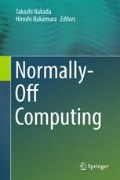Abstract
Improvement of energy efficiency is indispensable for computer systems in our rapidly evolving information society. To reduce energy consumption without performance degradation, aggressive and careful power management is necessary. Simple power gating cannot fully take the chances of power reduction since volatile memories lose data when power supply is off. However, with new non-volatile memories (NVMs), a synergetic effect for drastic energy reduction is highly expected. Normally-off computing is a way of computing where inactive components of computer systems are aggressively powered off with the help of new NVMs. As a result, high attention has been paid to normally-off computing using these NVMs and cooperation among algorithm, OS, compiler, architecture, circuit and device.
Access this chapter
Tax calculation will be finalised at checkout
Purchases are for personal use only
References
Need for a trillion sensors roadmap. Tsensors Summit. http://www.tsensorssummit.org/Resources/TSensors%20Roadmap%20v1.pdf
Ando, K., Yakushiji, K., Kubota, H., Fukushima, A., Yuasa, S., Kai, T., Kishi, T., Shimomura, N., Aikawa, H., Yoshikawa, M., Nagase, T., Nishiyama, K., Kitagawa, E., Daibou, T., Amano, M., Takahashi, S., Nakayama, M., Ikegawa, S., Nagamine, M., Ozeki, J., Watanabe, D., Yoda, H., Nozaki, T., Suzuki, Y., Oogane, M., Mizukami, S., Ando, Y., Miyazaki, T., Nakatani, Y.: Spin-RAM for normally-off computer. In: 11th Annual Non-Volatile Memory Technology Symposium (NVMTS), pp. 1–6 (2011). doi:10.1109/NVMTS.2011.6137104
Ando, K., Ikegawa, S., Abe, K., Fujita, S., Yoda, H.: Roles of non-volatile devices in future computer systems: normally-off computers. In: Hu, W.-C., Kaabouch, N. (eds.) Energy-Aware Systems and Networking for Sustainable Initiatives, pp. 83–107. IGI Global, Hershey (2014)
Puri, R., Stok, L., Bhattacharya, S.: Keeping hot chips cool. In: 42nd Design Automation Conference, pp. 285–288 (2005). doi:10.1109/DAC.2005.193818
Author information
Authors and Affiliations
Corresponding author
Editor information
Editors and Affiliations
Rights and permissions
Copyright information
© 2017 Springer Japan KK
About this chapter
Cite this chapter
Nakada, T., Nakamura, H. (2017). Introduction. In: Nakada, T., Nakamura, H. (eds) Normally-Off Computing. Springer, Tokyo. https://doi.org/10.1007/978-4-431-56505-5_1
Download citation
DOI: https://doi.org/10.1007/978-4-431-56505-5_1
Published:
Publisher Name: Springer, Tokyo
Print ISBN: 978-4-431-56503-1
Online ISBN: 978-4-431-56505-5
eBook Packages: Computer ScienceComputer Science (R0)

